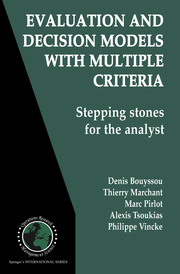Detailansicht
Evaluation and Decision Models with Multiple Criteria
Stepping stones for the analyst, International Series in Operations Research & Management Science 86
Bouyssou, Denis/Marchant, Thierry/Pirlot, Marc et al
ISBN/EAN: 9781441940537
Umbreit-Nr.: 1596909
Sprache:
Englisch
Umfang: xvi, 445 S.
Format in cm:
Einband:
kartoniertes Buch
Erschienen am 11.02.2011
Auflage: 1/2006
- Zusatztext
- InhaltsangabeIntroduction.- Problem formulation and structuring.- Numbers and preferences.- Aggregation-overture.- Aggregation procedures.- Multi-dimensional preference models.- Making recommendation.- Conclusion.- Bibliography.- Name index.- Subject index.
- Kurztext
- Formal decision and evaluation models are sets of explicit and well-defined rules to collect, assess, and process information in order to be able to make recommendations in decision and/or evaluation processes. They are so widespread that almost no one can pretend not to have used or suffered the consequences of one of them. In our earlier companion volume, Evaluation and Decision Models, we heavily criticised formal models but we also argued that they could be useful. On the other hand, Evaluation and Decision Models with Multiple Criteria is a guide, a way of reasoning aimed at helping the analyst to choose a model and use it consistently. We propose, often using an axiomatic point of view, a sound analysis of techniques aimed at supporting the decision aiding process. Our presentation is carried out within a unique framework that can be extended to most decision and evaluation models, as a "decision aiding methodology". Evaluation and Decision Models with Multiple Criteria is intended for the aware or enlightened practitioner, for anyone who uses decision or evaluation models---for research or for applications---and is willing to question his practice, to have a deeper understanding of what he does. The authors of this book are European academics working in four different universities and research institutions. They teach in engineering, mathematics, computer science and psychology schools. Their background is quite varied: mathematics, economics, engineering, law and geology, but they are all active in decision support and more particularly in multiple criteria decision support. Preference modelling, fuzzy logic, aggregation techniques, social choice theory, artificial intelligence, problem structuring, measurement theory and Operational Research are among their special interests. The authors are active in theoretical research on the foundations of decision aiding, mainly from an axiomatic point of view. Moreover, all the authors have been involved and continue to be engaged in a wide range of applications from software evaluation to location of a nuclear repository, through the rehabilitation of a sewer network or the location of high-voltage lines.
